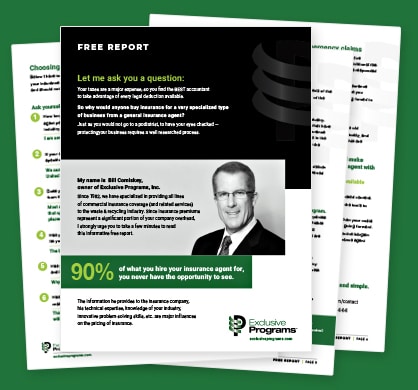Navigating the complexities of workers’ compensation is crucial for both employers and employees, particularly in industries like waste and recycling, where workplace injuries are a prevalent concern. One of the most pressing questions often asked is, “Does workers comp pay for lost wages?” In this detailed exploration, tailored to the needs of garbage collection companies in Florida, we’ll delve into the intricacies of workers’ compensation, shedding light on how it covers lost wages and providing comprehensive insights into the specific regulations governing compensation in the Sunshine State.
Understanding Workers’ Compensation in the Waste and Recycling Industry
So, does workers comp pay for lost wages? And how much does workers’ comp pay for lost wages in Florida? Workers’ compensation serves as a vital safety net for employees who sustain injuries while performing their job duties in the waste and recycling sector. This industry poses unique risks, ranging from manual handling injuries to vehicle accidents. Therefore, understanding the nuances of workers’ compensation laws and how they apply to garbage collection companies is essential for both employers and employees.
How Much Does Workers’ Comp Pay for Lost Wages in Florida?
When it comes to workers’ compensation in Florida, the amount paid for lost wages varies based on several factors. If an employee is entirely unable to work due to a workplace injury, they may be entitled to temporary total disability benefits, which typically amount to 66 2/3% of their average weekly wage. However, there’s a maximum weekly benefit cap, which changes annually. As of 2023, the maximum weekly benefit is $1,236, as cited by Forbes. Understanding these nuances is pivotal for both employers and employees navigating the aftermath of workplace injuries in the construction industry.
Navigating Florida’s Workers’ Compensation Laws: A Primer for Garbage Collection Companies
In Florida, workers’ compensation laws govern the process of obtaining benefits for workplace injuries, including compensation for lost wages. Garbage collection companies must adhere to these regulations to ensure compliance and protect the interests of both employees and employers. Understanding the specific provisions of Florida’s workers’ compensation laws is paramount for navigating the claims process effectively.
Exploring Wage Replacement Benefits: Temporary Total Disability vs. Temporary Partial Disability
When it comes to compensation for lost wages, workers’ compensation distinguishes between temporary total disability (TTD) and temporary partial disability (TPD). TTD benefits are available to employees who are entirely unable to work due to a workplace injury, whereas TPD benefits are provided to those who can work but in a limited capacity. Understanding the differences between these two types of benefits is crucial for both employers and employees seeking compensation for lost wages.
Factors Influencing Compensation for Lost Wages in Workers’ Compensation Claims
Several factors can influence the amount of compensation for lost wages in workers’ compensation claims. These factors may include the severity and duration of the employee’s disability, their average weekly wage, and the maximum weekly benefit cap set by the state. Employers and employees must be aware of these factors to accurately assess the compensation amount owed and ensure their rights are protected throughout the claims process.
Best Practices for Workplace Safety and Injury Prevention in the Waste Management Sector
Preventing workplace injuries is the most effective way to minimize the need for workers’ compensation and protect the well-being of employees in the waste management sector. Implementing robust safety protocols, providing comprehensive training, and conducting regular inspections are essential steps in promoting a safe work environment. Employers should also encourage open communication and employee participation in safety initiatives to foster a culture of safety and accountability within the organization.
Safeguard Employees and Optimize Insurance Costs
In conclusion, the question of Does workers comp pay for lost wages? is a pivotal concern for garbage collection companies and other businesses in the waste and recycling industry. By understanding the intricacies of workers’ compensation laws in Florida and taking proactive measures to prioritize workplace safety and compliance, employers can navigate the complexities of wage replacement benefits with confidence. While the specific amount paid for lost wages may vary depending on the circumstances of each case, ensuring adherence to state regulations and fostering a culture of safety and accountability are fundamental principles for fostering a secure and productive work environment.
For garbage collection companies seeking expert guidance on workers’ compensation and risk management solutions tailored to their unique needs, we invite you to explore our comprehensive services. Contact us today to learn more about how Exclusive Programs, Inc. can help safeguard your business and ensure optimal coverage and pricing for your insurance needs. Let us partner with you to protect your employees and your bottom line.



